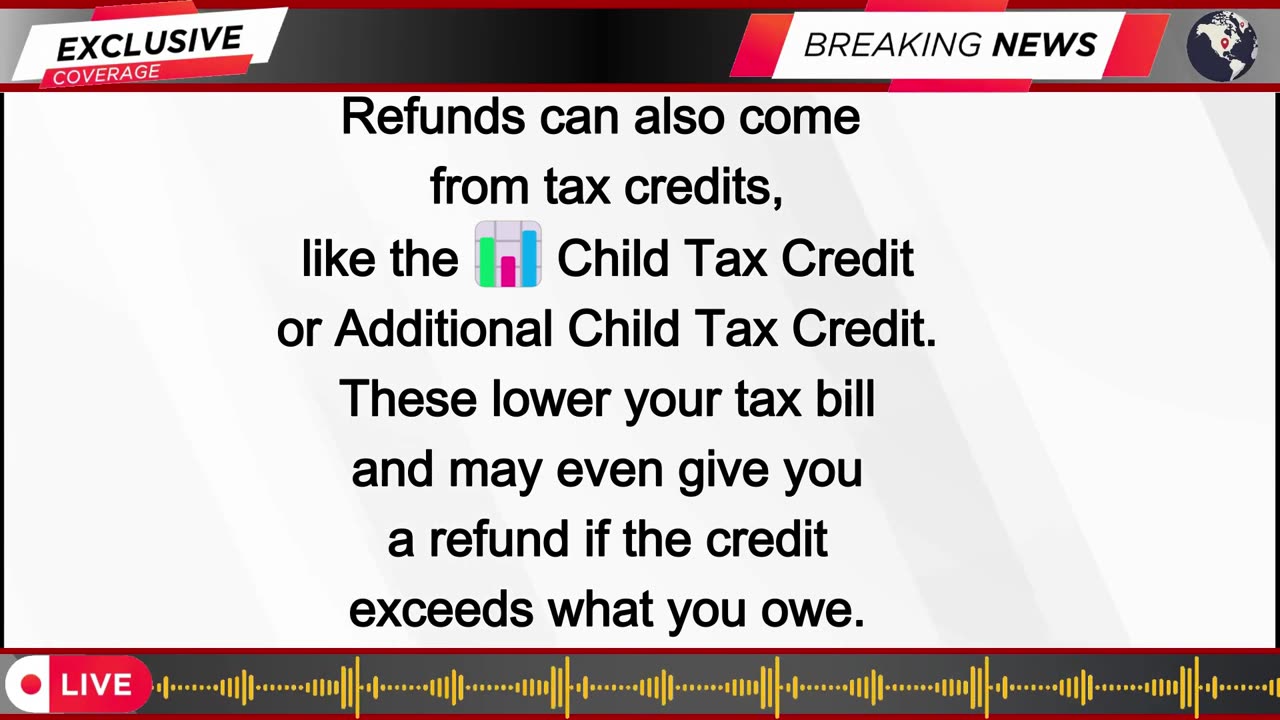Premium Only Content

IRS Tax Refund 2025 Update | IRS Refund Schedule 2025 | IRS Refund Timeline | IRS Refund Status News
have discussed
The Internal Revenue Service (IRS) is currently issuing average refund checks of $2,939 to eligible taxpayers following the closure of the 2024–2025 tax season. If you’ve recently filed your federal income tax return, this might be the moment your refund hits your bank account. With millions of Americans now receiving direct deposits or paper checks, this payout wave from the IRS could offer timely financial relief to working families, parents, and individuals facing financial stress.
I have discussed
Why are tax refunds issued in the first place? A major reason is the overpayment of taxes. Every month, employers withhold income tax from employees' paychecks and submit those payments to the IRS on their behalf. At the end of the fiscal year, taxpayers file their returns to calculate what they actually owed. If too much tax was withheld, a refund is generated. This is why filing your tax return remains critical, even if taxes are deducted throughout the year.
I have discussed
Refunds aren’t just generated by overpayments—they also stem from tax credits, especially refundable ones. The Child Tax Credit (CTC) and the Additional Child Tax Credit (ACTC) are among the most common refund sources. These credits reduce your tax liability and, if they exceed the tax you owe, the excess is refunded to you. This makes filing even more essential for parents and caregivers, especially those with lower income.
I have discussed
When can you expect your tax refund? Timing depends on how you filed. Taxpayers who submitted paper returns and opted for a paper check refund are likely to experience the longest delays—sometimes up to two months. However, if you e-filed your return and selected direct deposit, your refund could arrive in as little as 3 weeks. As of May 9, 2025, the IRS reports the average refund amount is $2,939, slightly higher than the average seen in 2024.
I have discussed
What if your refund hasn’t arrived yet? Several factors could be at play. If you owe federal or state back taxes, child support arrears, or have defaulted student loans, your refund might be withheld or reduced. This is due to the IRS’s authority to offset refunds for overdue financial obligations. To verify the reason for a delay, you can use the IRS “Where’s My Refund?” tool—a secure online platform that updates refund statuses within 24 hours of e-filing.
I have discussed
For those whose refunds are approved but not yet received, you may need to contact the IRS directly. Delays could be due to manual reviews, mismatches in reported income, or even identity verification procedures. If your refund is in limbo and you’ve already checked the refund tool, speaking with an IRS official could fast-track the resolution process. This is especially important for taxpayers still awaiting documentation or clarity.
I have discussed
Even if you're not expecting a refund, filing your tax return is mandatory. Many Americans assume that monthly tax deductions through payroll are enough—but this isn't true. The IRS requires an annual return to validate reported income, apply tax credits, and reconcile withholdings. This is especially relevant if you have investment income, freelance earnings, or any non-wage income, all of which must be reported properly.
I have discussed
Filing your taxes late or not at all can prevent you from receiving any eligible refunds and may lead to penalties or interest charges. Even if you owe taxes, it's better to file and work out a payment plan with the IRS rather than risk enforcement actions. With refund checks already being processed and delivered, eligible taxpayers still have a chance to receive their refunds before Sunday, depending on their filing and approval timelines.
I have discussed
Lastly, if you're still unsure whether you're eligible for the average refund amount or why you haven’t received your check yet, now is the time to act. You could be entitled to a refund nearing $3,000, which can help pay off bills, reduce debt, or boost your emergency savings. With the IRS in the final stages of the refund cycle for the 2024–2025 tax year, this is your opportunity to ensure everything is in order.
#IRSRefund #TaxRefund2025 #IRS2025Update #WheresMyRefund #ChildTaxCredit #FederalTaxRefund #TaxSeason2025 #IRSCheckStatus #IRSDirectDeposit #PaperCheckRefund #TaxReturnDelay #USATaxNews #IRSRefundDelay #AverageTaxRefund #TaxpayerRelief #TaxTips2025 #IRSHelp2025 #EFileTaxReturn
-
 40:24
40:24
The Connect: With Johnny Mitchell
1 day ago $13.08 earnedInside The WORST Drug-Infested Slums Of Medellin, Colombia
38.5K16 -
 5:41:58
5:41:58
MattMorseTV
16 hours ago $147.99 earned🔴Antifa RIOT vs. Federal OFFICERS.🔴
219K285 -
 4:01:21
4:01:21
Anvilight
5 hours agoCall of Duty | Black Ops 7 Beta Early Access Last Day!
7.71K -
 1:05:28
1:05:28
Man in America
19 hours agoLIVE: Digital ID & the DEATH of Freedom—An URGENT Warning
106K149 -
 1:45:37
1:45:37
Badlands Media
1 day agoDevolution Power Hour Ep. 395: Controlled Opposition, Government Shutdowns, and Trump’s Wartime Shift
296K105 -
 8:06:32
8:06:32
Phyxicx
18 hours agoStar Wars: Movie Battles II Community Event hosted by ReaperAF95 - 10/4/2025
51.4K1 -
 4:40:13
4:40:13
ABNERDAGREAT
7 hours ago🔴ZELDA MARATHON LETS FINISH THE FIGHT LOFI COPYRIGHT FREE MUSIC🔴
8.81K -
 1:43:56
1:43:56
Tundra Tactical
15 hours ago $49.08 earned🛑LIVE NOW!! FBI Gets Caught LYING About Good Guys With Guns For 10 YEARS!!!!
83.8K16 -
 3:19:12
3:19:12
LethalPnda
3 hours agoK-Pop Demon Hunters x Fortnite | Use code LETHALPNDA in the Item Shop!
7.76K -
 2:12:01
2:12:01
BlackDiamondGunsandGear
3 days agoAFTER HOURS ARMORY / Antifa / Lies/ Prison time
48.1K4
